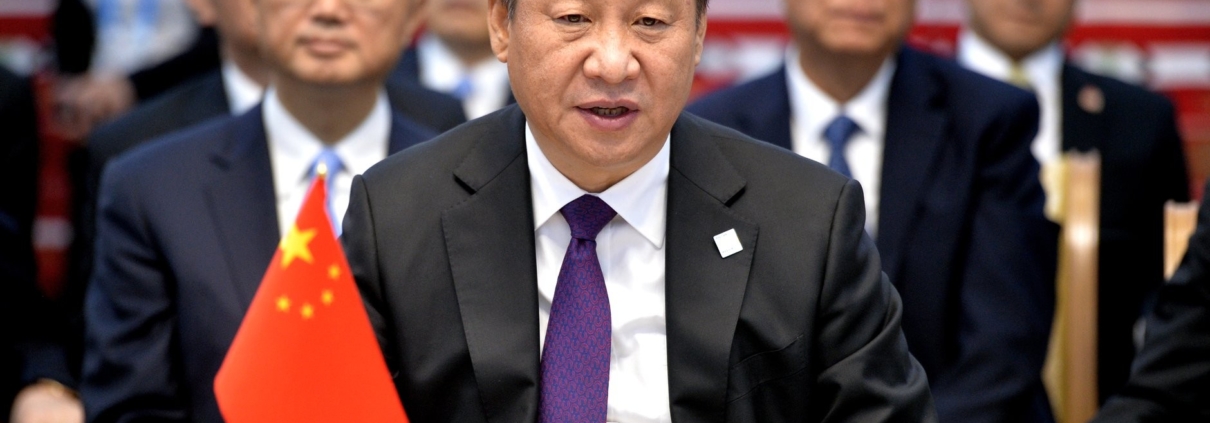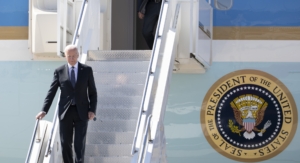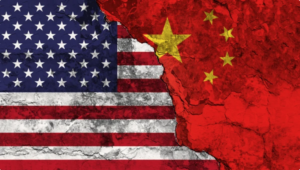Nevertheless Xi Persisted, Two Oppo Extremes, and Slicing Food Science Facts
Here’s What You Need To Know
This week, China’s parliament, the National People’s Congress (NPC), amended the Chinese constitution to remove term limits for President Xi Jinping – a moment that Xi has been building up to for a long time. Whether you agree with President Trump’s policies toward China or not, which most recently include starting a trade war by imposing controversial tariffs on steel and aluminum, his rhetoric has awakened mainstream attention to the trend of a persistent and assertive China that has previously been discussed within foreign policy circles. Here are three main levers Xi has been using to bring about his “Chinese Dream” of national rejuvenation while the American public’s attention has largely been focused elsewhere:
- Bolstering Security At Home And Abroad: Under Xi’s leadership, China has been rapidly pursuing military modernization and announced this week an 8.1 percent increase to its military spending. At the same time, China’s state surveillance, which initially was built out to suppress unrest in its western provinces, is rolling out across the country and even being exported to other authoritarian states around the world. The continued militarization of the South China Sea and other assertive actions abroad was highlighted in the U.S. Department of Defense’s 2018 National Defense Strategy, which names China as a “strategic competitor.” However, some have argued that Xi’s consolidation of power is indicative of insecurity rather than confidence and strength.
- Investing Heavily In Public Diplomacy: The Belt and Road Initiative (BRI), a multi-national zone of economic and political influence with Beijing at its core, is Xi’s flagship project that has led to Chinese investment across Asia, Africa, and Europe. Although some countries have been apprehensive about the geostrategic character of the initiative, they have taken the significant Chinese investment despite its tendency to encourage dependency and undermine the existing institutions in those countries. China has also been investing a significant amount in Latin America, to the detriment of the Monroe Doctrine, begging the question as to what the U.S. will do to buttress this historical cornerstone of America foreign policy going forward. On both, Secretary of State Rex Tillerson has recently sounded the alarm, but with President Trump’s withdrawal from the Trans-Pacific Partnership, the U.S. has diminished leverage.
- A Robust Campaign Of Foreign Influence: China has traditionally taken a long view of its robust foreign influence activities, whether using Chinese-sponsored cultural institutes on American college campuses, or spreading propaganda on Facebook and state-run English news outlets. China has also stepped up its human intelligence to gather defense and economic secrets, making FBI Director Christopher Wray’s testimony on Chinese influence timely – although it has been mocked as “Cold War era” thinking by a top Chinese government spokesman.
Despite the criticism of this Administration’s policies, the conventional approach taken by those in power has failed to address Xi’s rising China up to this point. This failure may be due to some faulty assumptions that should be discarded in favor of a policy of strategic counter pressure. While Trump’s current policy of direct confrontation has increased public awareness of Chinese adventurism, it would benefit from broader statecraft. Trump’s tendency to undermine admirable intentions of his policy with bad implementation, like his recently announced “unproductive” tariffs, means he may not get the results he seeks.
News You Can Use
TWO OPPO EXTREMES
Subscribe to Receive Insights
"*" indicates required fields
When it comes to opposition research, seemingly small details can make a big impact. For example, candidates running for office this year in crowded Democratic primaries are discovering that past residency in Washington, D.C. can be a campaign liability with voters when property records are obtained and leveraged by rival campaigns to paint an opponent as a “carpetbagger.” But what happens when people don’t remember why they should care about the details of a candidate’s past?
That oppo conundrum may be the case “across the pond,” as voters seem to be letting Labour Party leader Jeremy Corbyn off the hook for his alleged interactions with Czech Intelligence during the Cold War more than three decades ago. This example demonstrates how time can dull voters’ perceptions, lending further credence to the importance of taking opposition research seriously, and defining one’s opponent early and often – before time runs out.
CROSSED SOUNDWAVES IN CUBA?
Theories of what caused Americans to suffer injuries due to a “sonic attack” of an unknown nature in Havana have led to a number of nefarious explanations, but computer scientists at the University of Michigan stumbled across a possible (and comparably) benign and simple one: that a pair of Cuban eavesdropping devices were placed too close together, “tripping the ultrasound that ironically was supposed to make their presence quiet,” resulting in a disturbing, harmful sound.
Associate professor Kevin Fu and his team’s interest was piqued when ultrasound was theorized as a possible explanation for the attacks, but as Fu said, “it didn’t make sense. Ultrasound is inaudible [to humans], and you wouldn’t hear it.” The technical report released by Fu and his team provides a plausible hypothesis of what happened in Cuba, although they admit that “additional evidence” is needed to determine whether correlation is causation. Should this hypothesis stand up to more scrutiny, it remains to be seen what – if anything – the Trump Administration would do to reverse actions taken to punish the island’s regime for failing to provide safety for American diplomatic personnel.
IS DATA ENOUGH?
In a surprising turn of events, 72 percent of C-suite executives across a variety of sectors believe that if their industry is to be disrupted, it will be from legacy companies rather than new startups or “digital giants” like Google, Facebook, and LinkedIn. The reason behind this thinking is that Big Tech – contrary to the prevailing wisdom – only controls around 20 percent of the world’s commercializable data, whereas “far older incumbents like Unilever, Procter & Gamble, Bank of America” and Santander own approximately 80 percent.
With no single company monopolizing it, Artificial Intelligence (AI) can be used by large companies to customize and monetize their own proprietary data. Yet, in today’s fast-moving policy landscape where continued scrutiny is focused on how companies use data, the regulatory environment may provide the ultimate verdict on what industries are ripe for disruption.
KNOWN CLIMATE UNKNOWNS
A recent study by climate scientists in a French journal received little attention in the U.S. media, and the reason why may be because it did not fit the narrative of much of the environmental journalism in the American media. The study narrows “the range of expected warming to be between 2.2 and 3.4 degrees Celsius,” ruling out the possibility of warming greater than 4 degrees, which has been predicted by the U.N.’s Intergovernmental Panel on Climate Change for the last 25 years.
This study is “the latest crystallization of a trend” that concludes less warming than previously predicted, and more “uncertainty” on the part of the scientists as to how much warming to expect and what its outcome will be for humanity. Climate science reporting that relies on a narrative that leaves out uncertainty is distorting the public policy debate, suggesting that a recognition of the known climate unknowns would make for a more nuanced evaluation of the cause and effect of environmental policies.
SLICING AND DICING FOOD SCIENCE FACTS
Is shoddy data at the heart of viral studies on healthy eating featured in prominent outlets like the Today show and The New York Times? According to a Buzzfeed investigation into the work of the head of Cornell’s prestigious Food and Brand Lab, it appears so. The investigation cites instances where Professor Brian Wansink “discussed and even joked about exhaustively mining datasets for impressive-looking results,” publishing subpar studies with statistically insignificant results in academic journals with “low standards,” and framing findings to stir up media coverage to “go virally big time.”
With internal and external pressures on university professors to publish studies and gain prestige, the scientific process can suffer, instead leading to scientists slicing and dicing facts to draw “exciting, sexy” conclusions from ambiguous data. However, rest assured that the research bullpen at Delve knows that nothing is more exciting or sexier than providing our clients scrupulously-sourced facts that can be independently verified by a third party.



